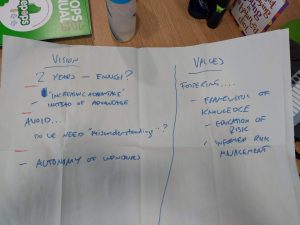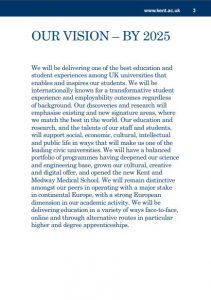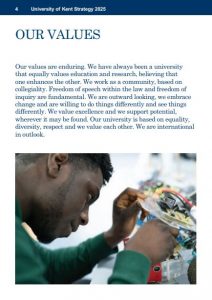
Last week we held a second workshop to discuss the creation of a copyright literacy strategy at the University of Kent (slides here). We began the process back in May and we identified a range of areas where the group felt copyright literacy was relevant. I got some very helpful pointers in how we should update our copyright policy and I will talk more about that in a future post. However for this post, I wanted to cover the idea of taking a strategic approach to copyright literacy, think about what it actually means and talk about some of the things that came up in the discussion.
I decided to start by looking at the University’s current “Kent 2025” strategy and think about the way it was structured. Clearly, any attempt to look at copyright literacy from a strategic perspective would need to link back to the institution’s overall strategy otherwise there would be no justification for doing so. Like many people I have sometimes found strategies quite difficult to work with. In my experience they can include vague statements that don’t help to distinguish why one organisation is different from any other. However, in looking at the Kent strategy I was pleased to see some things which stood out as important, distinctive and helpful for thinking about how and why we might want to raise awareness of copyright.


The Kent 2025 document states a clear vision and a set of values, followed by a series of ambitions and actions. I picked out a few areas that I thought were relevant to copyright:
- our ambition to continue to support cultural life in order to be a leading civic university,
- our strong links with Europe [I noted that there is an ongoing programme to harmonise EU copyright law],
- our commitment to delivering education in a variety of ways, including online,
- upholding the value of freedom of speech with the law and freedom of enquiry,
- equality, diversity and respect – a key aspect of which is creating accessible materials for our students and staff
Inspired by these I proposed a number of statements or ideas relating to copyright literacy which I asked those at the workshop to comment on or add to, which are in the table below.
| Vision | Values |
| Two-year vision? | Valuing a responsible yet critical approach? |
| To be a copyright literate institution? | Acting lawfully but acknowledging the need to challenge assumptions? |
| To take full advantage of the provisions in UK copyright law? | Balancing copyright compliance with freedom of speech and academic freedom? |
| Avoid copyright being a barrier, particularly around misunderstandings? | Fostering a culture of…
|
I found this to be a really interesting exercise which revealed a lot about what a copyright literacy strategy might need to look like and what its purpose would be. As is often the case when discussing copyright, the tensions between different perspectives became very apparent. The potential vision of “becoming a copyright literate institution” generated a lot of debate as to what that actually meant. It clearly wouldn’t mean finding a single consensus position within the University on all issues where copyright is relevant – for example how to approach the recording of lectures and the use of those recordings after the event. However, one suggestion that came out of this process was to try to prepare for the ways in which these tensions might play out and prepare for expressing them in a constructive way. It might also be useful to consider the ways in which decisions are made about ownership of copyright and liability for infringement, as well as situations where policies and practices are open to interpretation and debate.
One thing that arose which I think should be a key component of the strategy is expressing a vision and set of values where individuals and groups are able to make autonomous but informed decisions about copyright. I found during my masters research last year that many universities were not clearly able to express the ways that decisions around copyright were made, and that there was a confusion between concepts of responsibility and accountability. It was good to hear my colleagues talking about ways that we might address this by explicitly conveying the the need to work with copyright issues in a nuanced way.
The discussion about institutional culture was also very useful, with the acceptance that our institution (like many) is not looking to adopt a high risk strategy in the current political and economic climate. However, we did identify the possibility of expanding people’s perception of risk through education so that they weren’t being overly cautious and potentially limiting the institution’s ability to achieve its aims.
In addition to the above we made quite a bit of progress on the strategic ambition and actions and, as previously mentioned, the copyright policy. However, both of those are to feature in future posts. In the meantime I have agreed to produce a draft copyright literacy strategy document which I will send out to the working group for further comment.
I would be very happy to share further reflections from anyone who is going through a similar process at their own institution. I am also very pleased to have heard recently that my and Jane Secker’s proposal to present on copyright literacy, open practice and the role of academic development has been accepted for the SEDA Autumn Conference in November. That will be an opportunity to reflect on the ways in which strategies and policies relating to copyright influence academic practice. In the meantime, have a great summer and I’ll post again on developments at Kent as soon as I can.
